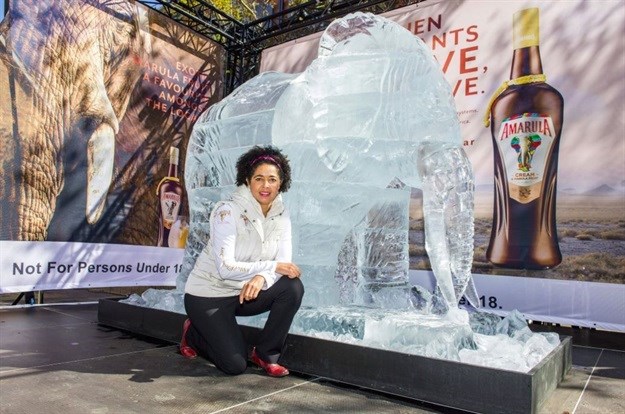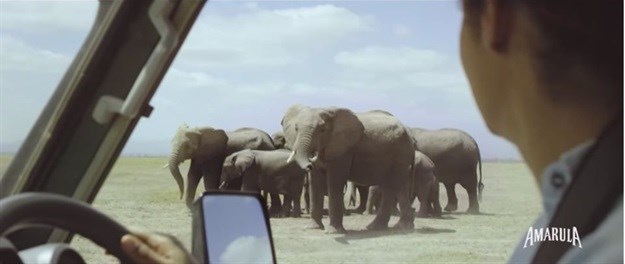Around 96 African elephants are poached for their ivory every day, that's one elephant every 15 minutes.
In an effort to raise awareness of the plight of the African elephant, Amarula, in partnership with WildlifeDirect, on World Elephant Day this year launched their #DontLetThemDisappear campaign in various markets across the globe. The campaign saw life-size elephant ice sculptures appear in Johannesburg, Toronto and São Paulo - the melting of which symbolised the disappearance of these majestic beasts.
Amarula Trust ambassador and CEO of WildlifeDirect Dr Paula Kahumbu earlier this month made a trip to South Africa to mark World Elephant Day, celebrated annually on 12 August, and to share the message that everyone has a role to play in ending poaching of elephants in Africa. We spoke to Kahumbu about her work in elephant conservation, the impact of elephant poaching on ecosystems and tourism, as well as how she stays positive about the future of wildlife in a world with ever-encroaching human development on natural landscapes.
Born and raised in Kenya, Kahumbu has always been interested in nature and animals. During her studies, she was steered toward more laboratory-based, secretarial work; however, she was far more interested in field research - an area not so easy for women to get into at the time. Her research initially focused primarily on monkeys as she was convinced that elephants were a dead-end at the height of the poaching. Following the global ban on ivory trade, elephant populations started to recover and Kahumbu decided to do her PhD on elephants, contributing to a growing body of knowledge following the success of the ban. Soon after the ban and the recovery of elephant populations, there were calls to reopen the ivory trade.
"Having just come from a situation where our elephants appeared to be doomed, I made the decision to go and work on the issues to do with policy, to do with conservation and behaviour change around ivory trade itself, and that's how I really got into conservation," explained Kahumbu.
A world without elephants
She painted us a picture of a bleak future in which elephants are extinct.
"Elephants are considered a keystone species because they have such a profound impact on environments. They are really ecosystem engineers," Kahumbu explained.
"They eat certain plants in certain ways and they move over vast landscapes so they're moving nutrients around ecosystems the whole time, but they're also eating a lot of fruit and distributing the seeds, and there are some plants that will only germinate if they go through the gut of an elephant. Just from that perspective alone, if you removed elephants, certain plants would just vanish because they won't germinate anymore."
Elephants, through their digging, pulling of trees and breaking branches, also create microhabitats within ecosystems that support many other species, she explained. This constant activity prevents thick thorny bushes from dominating an environment, resulting in more productive, diverse ecosystems. They also create paths through forests and bushes that allow ungulates to reach otherwise inaccessible areas.
The impact of the loss of elephants on some African economies would also be quite dire as they are a big tourist drawcard in places like Kenya and Tanzania. The knock-on effect on related industries, such as hospitality, transport, retail and recreation, would also be significant as the countries experience a decline in international visitors.
Strained elephant-human interaction
Poaching also has a significant impact on elephant-human interaction, Kahumbu explained.
"When poachers come into these landscapes, they target the ones with the biggest tusks. You can imagine in a human family, because they're so like humans, if you remove the adults from that ecosystem, and you remove the knowledge of the whole society of elephants, you're left with a bunch of juveniles who become very dangerous, very scared, very skittish.
"They hate people, obviously, because they've witnessed [the poaching] and they remember forever, really. You end up with a situation where it's not a pleasure to watch them - you go into a park where elephants have been poached and they will literally run. There are parts of Tanzania where even though there are elephants around, you won't see them - they just have to hear the rumbling of the car, and they can hear it through their feet, and they will start running away - they are so scared of vehicles or people."
In some instances in Mozambique, the elephants, traumatised by a history of poaching, are more actively defensive and many tourists have had their cars tossed. "There hasn't been poaching for 20 years or so, but the elephants have remembered and passed on that knowledge from matriarch to the mothers to the daughters. You drive into those places and the elephants, they could be 50 metres away and they'll charge, and toss your car if you don't get out of the way," explained Kahumbu.
Stemming demand for ivory
Poaching being a global problem, with many countries involved in the transit of illicit ivory, raising awareness is just one of the ways in which WildlifeDirect is looking to stem the tide of poaching and illegal ivory trade. Independently of the campaign with Amarula, the organisation has been to China to address the primary source of demand. Following theirs and the work of many other global conservation organisations in the country, China has banned trade in ivory, but Kahumbu says these efforts need to be scaled up, with focus shifting to the individual.
"As long as no-one wants to buy it, there'd be no demand and no profit in it for anybody, and that's really what we have to strive to achieve."
Nature conservation vs development
Rich in natural heritage, Africa is somewhat caught between a rock and a hard place when it comes to attaining its development goals, while still conserving the environment. Looking to avoid mass youth unemployment in the coming years, many countries are working hard to accelerate development in order to create jobs. According to Kahumbu, this accelerated pace of development undermines the environmental and health sustainable development goals of Africa.
"I think our governments are on a dangerous pathway in arguing that the environment can wait - we develop first and we deal with the environment later. In fact Europe and even China today are busy trying to re-establish those broken ecosystems which broke because of the way they developed. We're at a crossroads in Africa where we can actually make the right decisions for the future of the continent.
"Tourism is one of the fastest growing industries because as people become richer, they aspire for meaningful experiences. If we secure our wildlife, as we develop, we make the securing of our wild places a major part of our development. The cost of reintroducing animals when we lose them is astronomical, and we're seeing that now with Mozambique who are struggling to rebuild its parks; the same with Rwanda - they're spending tens of millions of dollars trying to re-establish just a few rhinos, and a few lions, because they've lost these animals from their ecosystems.
"Who wants to live in a country where there're no green spaces, no open landscapes, nowhere to take your children to enjoy a day out and watch elephants and giraffes - to me it's such a no-brainer, I don't know why it's not captured in all of our visions."
Positive about the future
Kahumbu, however, remains positive about the future of Africa's wildlife, being particularly inspired by the continent's youth who are becoming less and less accepting to the destruction of their natural heritage, challenging authorities, and demanding healthy environments. She's also made hopeful by all the global support conservation organisations in Africa receive in spreading their message and looking to collaborate on protecting Africa's natural environment.
Women in conservation
As a young woman, Kahumbu's ambitions of field work weren't always supported, but she worked against the grain in her quest to save Africa's wildlife. What she discovered on the job was that women are much better at certain kinds of field research, she explained, observing and studying the behaviour of animals. "If you look at the top people in elephant and primate conservation – Jane Goodall, Dian Fossey, Cynthia Moss, Joyce Poole, these are people who have spent decades in observing and studying animals for a very long period of time and understanding them as individuals and then changing the world’s opinion about these animals.
"Previously, animals like gorillas and chimpanzees were seen as dangerous, threatening creatures, but now we know that these animals are gentle and interesting, fascinating, and the same for elephants. It took research on studying individual elephants for decades for us to know just how intimate their relationships are with each other – how they communicate, how they share information and knowledge, how they have languages. If we let them disappear, we would be poorer for it as a human species."




















